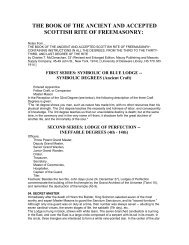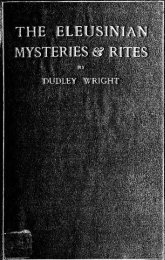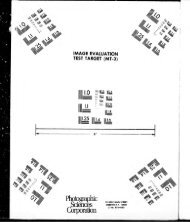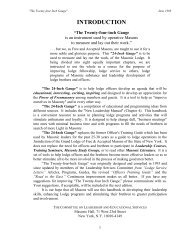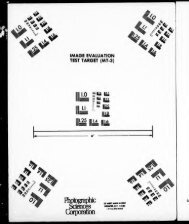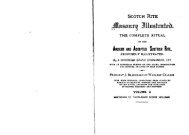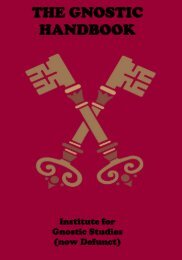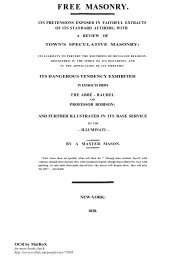The History of Initiation - The Masonic Trowel
The History of Initiation - The Masonic Trowel
The History of Initiation - The Masonic Trowel
Create successful ePaper yourself
Turn your PDF publications into a flip-book with our unique Google optimized e-Paper software.
IN PERSIA. 63<br />
by the monarch, Darius Hystaspes, 9 who accompanied<br />
him into Cashmere, 10 for the purpose <strong>of</strong> completing his<br />
preparatory studies by the instruction <strong>of</strong> the Brahmins,<br />
from whom he had previously received initiation, 11 After<br />
having obtained a complete knowledge <strong>of</strong> their theological,<br />
mathematical, and astronomical system, he returned<br />
into Bactria, arid took up his residence with his royal<br />
patron<br />
at Balk. 12<br />
He began with their religion. Before his time the<br />
Persians worshipped in the open air, and resisted the innovation<br />
<strong>of</strong> covered temples, 13<br />
long after they were<br />
adopted by other nations; for they thought that an<br />
immaterial Being could not be confined in buildings<br />
erected by the hand <strong>of</strong> man; and, therefore, they considered<br />
the broad expanse <strong>of</strong> heaven as the sublime cover-<br />
ing <strong>of</strong> a temple consecrated to the Deity. 14 <strong>The</strong>ir places<br />
<strong>of</strong> sacrifice were <strong>of</strong> an open and very simple nature, be-<br />
ing elevated on hills, 15 and composed principally <strong>of</strong> irregular<br />
circles <strong>of</strong> unhewn stone, like those <strong>of</strong> the northern<br />
nations <strong>of</strong> Europe. 16<br />
<strong>The</strong>y abominated images, 17 and<br />
worshipped the Sun and Fire, 13 as representatives <strong>of</strong> the<br />
ciated his name with those <strong>of</strong> Confucius, Mahomet, and other successful<br />
reformers <strong>of</strong> religious<br />
rites.<br />
9<br />
Hyde. Rel. vet. Pers., p. 323.<br />
10 "Cashmere, which has <strong>of</strong>ten been called the terrestrial paradise,<br />
In<br />
may indeed be justly denominated the holy land <strong>of</strong> superstition.<br />
the Ayeen Akbery, forty-five places are stated tr> be dedicated to<br />
Mahadeo; sixty-four to Vishnu; twenty-two to Durga: and only<br />
three to Brahma." (Maur. Ind. Ant., vol. v.. p. 861.)<br />
11 Am. Marcell., 1. xiii.<br />
12 Prid. Con., vol. i., p. 220. _<br />
13 <strong>The</strong> Persians were not singular in this custom ; for the early<br />
Egyptians, as well as the Druids and others, worshipped in uncover-<br />
ed temples. (Clem. Alex. Strom., 5. Lucian de Dea Syria.)<br />
u 15<br />
Vid. Cic. de. 1. Leg., ii., c. 2.<br />
Strabo., 1. xv.<br />
10<br />
By some unexplained process in the human mind, huge stones<br />
were always objects <strong>of</strong> veneration with every people who had forsaken<br />
the true God.<br />
17 Herod. Clio., 1. i. Yet, "according to the Zinat o'ttawarikh,<br />
idolatry first arose in Persia, from survivors preserving the busts and<br />
images <strong>of</strong> their deceased friends ; which, in subsequent ages, were<br />
venerated with divine honours by their posterity." (Wait. Orient.<br />
Ant., p. 11.)<br />
18 Even the Jews in their idolatries were not exempt from the su-<br />
perstitious adoration <strong>of</strong> this element, a practice which they pretended<br />
to justify from their own Scriptures. God, say they, appeared in<br />
the Cherubim over the gate <strong>of</strong> Eden as a flaming sword, (Gen. iii.,



